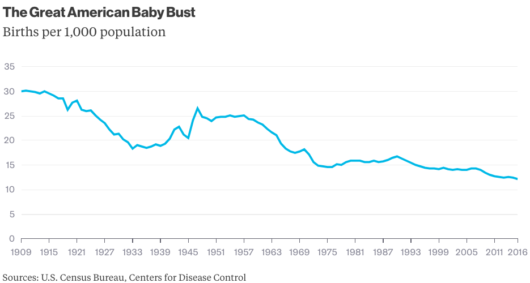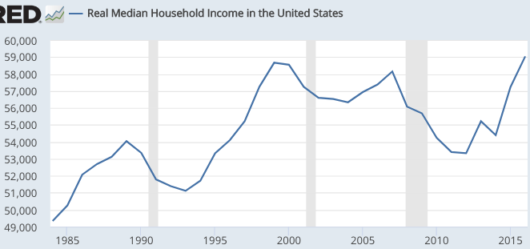A few years ago it was conventional wisdom that the Great Recession reduced America’s birth rate. That’s possible, but it’s striking how little evidence there is for that claim. It’s true that the birth rate declined between 2007 and 2010, but we all know that correlation doesn’t prove causation. And there’s a lot of evidence pointing in the opposite direction. Here’s one popular measure of the birth rate:
 Now let’s consider all of the evidence against the claim that the Great Recession reduced America’s birth rate:
Now let’s consider all of the evidence against the claim that the Great Recession reduced America’s birth rate:
1. Rich countries tend to have much lower birth rates than poor countries. So poverty doesn’t seem to reduce birth rates.
2. If you prefer time series evidence; the US birth rate has trended down for 100 years, even as we’ve become much richer.
3. It’s true that the birth rate fell during the 1930s, but it fell much faster during the booming 1920s. It fell especially sharply during 1955-73, one of the very best periods ever for having big nuclear families with stay at home moms. The birth rate was flat during the bad period of 1979-83, when unemployment soared to 10.8%, but fell during the booming 1990s. Go figure.
4. In 2016, the birth rate declined in 2016 to the lowest rate ever, despite one of the fastest 2-year growth spurts in real median household income ever seen in US data:
 There may be a slight lag in the impact of the economy on the birth rate, but if we don’t see a sharp rise in the birth rate in 2017, then we may need to revise the conventional wisdom on the Great Recession.
There may be a slight lag in the impact of the economy on the birth rate, but if we don’t see a sharp rise in the birth rate in 2017, then we may need to revise the conventional wisdom on the Great Recession.
5. The birth rate decline has been far sharper for teens than for other groups:
In the United States, teen-aged moms are increasingly rare. In 2016, the teen birth rate dropped 9% compared to the previous year, a new government report published Friday found. This record low for teens having babies continues a long-term trend.
The birth rate among teen girls has dropped 67% since 1991, according to the National Center for Health Statistics, which presented preliminary data for 2016 based on a majority (99.9%) of births.
In 2016, the number of US births totaled 3,941,109, a decline of 1% compared to 2015. The fertility rate of 62 births per 1,000 women is a record low for the nation.
The teen rate is a “phenomenal decline,” said Dr. Elise Berlan, a physician in the section of adolescent medicine at Nationwide Children’s Hospital.
Interestingly, this sharp decline in teen births occurred during a period when teens are increasingly delaying the adoption of adult-like behavior. The share of teens that date, have sex, drive cars, drink alcohol, smoke, work on jobs, and other similar activities is falling sharply. I doubt the Great Recession caused teens to not want to date, drink, or get a drivers license. More likely, we are seeing a longer term cultural change, driven by factors unrelated to the business cycle. (Also note that the really sharp decline in teen births began with the Great Recession, and has continued right up until the present time.)
One thing I can’t stand about cultural conservatives is that they are always pessimistic about the younger generation. I recall back in 1991 that America’s cultural conservatives were wringing their hands at how the high teenage birth rate and crack cocaine addiction was going to lead to a generation of dysfunctional children. Since then, we’ve seen a massive decline in teen births, and also a huge decline in crime, divorce, and lots of other metrics of social distress. America’s teens are behaving amazing responsibly, (maybe too responsibly, IMHO).
So are the social conservatives trumpeting this wonderful turnaround? No. Instead of celebrating this cultural trend they find new things to worry about—rising use of opioids, single moms, or the fears that immigration will bring in low IQ people that dilute our gene pool.
I really, really wish that cultural conservatives would just cheer up. (Or light up a joint in one of the states where it’s now legal, and chill.)